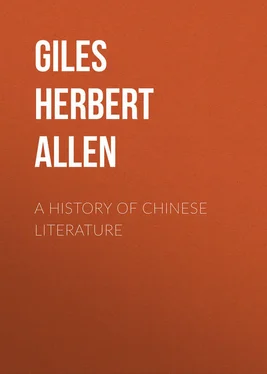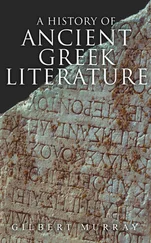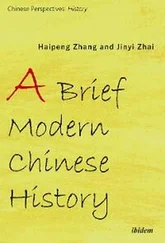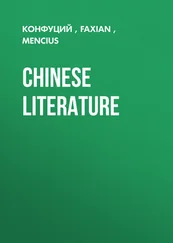Herbert Giles - A History of Chinese Literature
Здесь есть возможность читать онлайн «Herbert Giles - A History of Chinese Literature» — ознакомительный отрывок электронной книги совершенно бесплатно, а после прочтения отрывка купить полную версию. В некоторых случаях можно слушать аудио, скачать через торрент в формате fb2 и присутствует краткое содержание. Жанр: Критика, foreign_antique, foreign_prose, на английском языке. Описание произведения, (предисловие) а так же отзывы посетителей доступны на портале библиотеки ЛибКат.
- Название:A History of Chinese Literature
- Автор:
- Жанр:
- Год:неизвестен
- ISBN:нет данных
- Рейтинг книги:5 / 5. Голосов: 1
-
Избранное:Добавить в избранное
- Отзывы:
-
Ваша оценка:
- 100
- 1
- 2
- 3
- 4
- 5
A History of Chinese Literature: краткое содержание, описание и аннотация
Предлагаем к чтению аннотацию, описание, краткое содержание или предисловие (зависит от того, что написал сам автор книги «A History of Chinese Literature»). Если вы не нашли необходимую информацию о книге — напишите в комментариях, мы постараемся отыскать её.
A History of Chinese Literature — читать онлайн ознакомительный отрывок
Ниже представлен текст книги, разбитый по страницам. Система сохранения места последней прочитанной страницы, позволяет с удобством читать онлайн бесплатно книгу «A History of Chinese Literature», без необходимости каждый раз заново искать на чём Вы остановились. Поставьте закладку, и сможете в любой момент перейти на страницу, на которой закончили чтение.
Интервал:
Закладка:
The chapter closes with a paragraph which has gained for its writer an additional epithet, Butterfly Chuang: —
“Once upon a time, I, Chuang Tzŭ, dreamt I was a butterfly, fluttering hither and thither, to all intents and purposes a butterfly. I was conscious only of following my fancies as a butterfly, and was unconscious of my individuality as a man. Suddenly, I awaked, and there I lay, myself again. Now I do not know whether I was then a man dreaming I was a butterfly, or whether I am now a butterfly dreaming I am a man.”
Chuang Tzŭ is fond of paradox. He delights in dwelling on the usefulness of useless things. He shows that ill-grown or inferior trees are allowed to stand, that diseased pigs are not killed for sacrifice, and that a hunchback can not only make a good living by washing, for which a bent body is no drawback, but escapes the dreaded press-gang in time of war.
With a few illustrative extracts we must now take leave of Chuang Tzŭ, a writer who, although heterodox in the eyes of a Confucianist, has always been justly esteemed for his pointed wit and charming style.
(1.) “It was the time of autumn floods. Every stream poured into the river, which swelled in its turbid course. The banks receded so far from one another that it was impossible to tell a cow from a horse.
“Then the Spirit of the River laughed for joy that all the beauty of the earth was gathered to himself. Down with the stream he journeyed east, until he reached the ocean. There, looking eastwards and seeing no limit to its waves, his countenance changed. And as he gazed over the expanse, he sighed and said to the Spirit of the Ocean, ‘A vulgar proverb says, that he who has heard but part of the truth thinks no one equal to himself. And such a one am I.
“‘When formerly I heard people detracting from the learning of Confucius, or underrating the heroism of Po I, I did not believe. But now that I have looked upon your inexhaustibility – alas for me had I not reached your abode, I should have been for ever a laughing-stock to those of comprehensive enlightenment!’
“To which the Spirit of the Ocean replied, ‘You cannot speak of ocean to a well-frog, the creature of a narrower sphere. You cannot speak of ice to a summer-insect, – the creature of a season. You cannot speak of Tao to a pedagogue: his scope is too restricted. But now that you have emerged from your narrow sphere and have seen the great ocean, you know your own insignificance, and I can speak to you of great principles.’”
(2.) “Have you never heard of the frog in the old well? – The frog said to the turtle of the eastern sea, ‘Happy indeed am I! I hop on to the rail around the well. I rest in the hollow of some broken brick. Swimming, I gather the water under my arms and shut my mouth. I plunge into the mud, burying my feet and toes; and not one of the cockles, crabs, or tadpoles I see around me are my match. [Fancy pitting the happiness of an old well, ejaculates Chuang Tzŭ, against all the water of Ocean!] Why do you not come, sir, and pay me a visit?’ 5 5 “To the minnow, every cranny and pebble and quality and accident of its little native creek may have become familiar; but does the minnow understand the ocean tides and periodic currents, the trade-winds, and monsoons, and moon’s eclipses…?” — Sartor Resartus , Natural Supernaturalism.
“Now the turtle of the eastern sea had not got its left leg down ere its right had already stuck fast, so it shrank back and begged to be excused. It then described the sea, saying, ‘A thousand li would not measure its breadth, nor a thousand fathoms its depth. In the days of the Great Yü, there were nine years of flood out of ten; but this did not add to its bulk. In the days of T’ang, there were seven years out of eight of drought; but this did not narrow its span. Not to be affected by duration of time, not to be affected by volume of water, – such is the great happiness of the eastern sea.’
“At this the well-frog was considerably astonished, and knew not what to say next. And for one whose knowledge does not reach to the positive-negative domain, to attempt to understand me, Chuang Tzŭ, is like a mosquito trying to carry a mountain, or an ant to swim a river, – they cannot succeed.”
(3.) “Chuang Tzŭ was fishing in the P’u when the prince of Ch’u sent two high officials to ask him to take charge of the administration of the Ch’u State.
“Chuang Tzŭ went on fishing, and without turning his head said, ‘I have heard that in Ch’u there is a sacred tortoise which has been dead now some three thousand years. And that the prince keeps this tortoise carefully enclosed in a chest on the altar of his ancestral temple. Now would this tortoise rather be dead, and have its remains venerated, or be alive and wagging its tail in the mud?’
“‘It would rather be alive,’ replied the two officials, ‘and wagging its tail in the mud.’
“‘Begone!’ cried Chuang Tzŭ. ‘I too will wag my tail in the mud.’”
(4.) “Chuang Tzŭ one day saw an empty skull, bleached, but still preserving its shape. Striking it with his riding whip, he said, ‘Wert thou once some ambitious citizen whose inordinate yearnings brought him to this pass? – some statesman who plunged his country in ruin, and perished in the fray? – some wretch who left behind him a legacy of shame? – some beggar who died in the pangs of hunger and cold? Or didst thou reach this state by the natural course of old age?’
“When he had finished speaking, he took the skull, and placing it under his head as a pillow, went to sleep. In the night, he dreamt that the skull appeared to him, and said, ‘You speak well, sir; but all you say has reference to the life of mortals, and to mortal troubles. In death there are none of these. Would you like to hear about death?’
“Chuang Tzŭ having replied in the affirmative, the skull began: – ‘In death, there is no sovereign above, and no subject below. The workings of the four seasons are unknown. Our existences are bounded only by eternity. The happiness of a king among men cannot exceed that which we enjoy.’
“Chuang Tzŭ, however, was not convinced, and said, ‘Were I to prevail upon God to allow your body to be born again, and your bones and flesh to be renewed, so that you could return to your parents, to your wife, and to the friends of your youth – would you be willing?’
“At this, the skull opened its eyes wide and knitted its brows and said, ‘How should I cast aside happiness greater than that of a king, and mingle once again in the toils and troubles of mortality?’”
(5.) “The Grand Augur, in his ceremonial robes, approached the shambles and thus addressed the pigs: —
“‘How can you object to die? I shall fatten you for three months. I shall discipline myself for ten days and fast for three. I shall strew fine grass, and place you bodily upon a carved sacrificial dish. Does not this satisfy you?’
“Then speaking from the pigs’ point of view, he continued, ‘It is better perhaps after all to live on bran and escape the shambles…’
“‘But then,’ added he, speaking from his own point of view, ‘to enjoy honour when alive one would readily die on a war-shield or in the headsman’s basket.’
“So he rejected the pigs’ point of view and adopted his own point of view. In what sense then was he different from the pigs?”
(6.) “When Chuang Tzŭ was about to die, his disciples expressed a wish to give him a splendid funeral. But Chuang Tzŭ said, ‘With heaven and earth for my coffin and shell, with the sun, moon, and stars as my burial regalia, and with all creation to escort me to the grave, – are not my funeral paraphernalia ready to hand?’
“‘We fear,’ argued the disciples, ‘lest the carrion kite should eat the body of our Master’; to which Chuang Tzŭ replied, ‘Above ground I shall be food for kites, below I shall be food for mole-crickets and ants. Why rob one to feed the other?’”
Читать дальшеИнтервал:
Закладка:
Похожие книги на «A History of Chinese Literature»
Представляем Вашему вниманию похожие книги на «A History of Chinese Literature» списком для выбора. Мы отобрали схожую по названию и смыслу литературу в надежде предоставить читателям больше вариантов отыскать новые, интересные, ещё непрочитанные произведения.
Обсуждение, отзывы о книге «A History of Chinese Literature» и просто собственные мнения читателей. Оставьте ваши комментарии, напишите, что Вы думаете о произведении, его смысле или главных героях. Укажите что конкретно понравилось, а что нет, и почему Вы так считаете.












